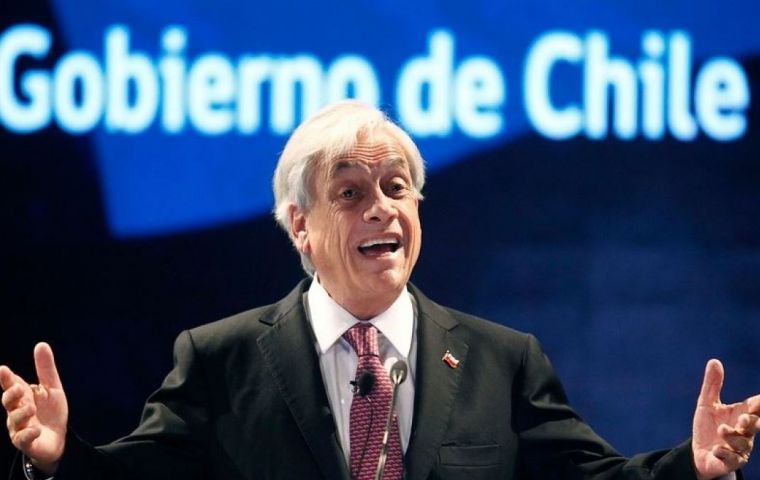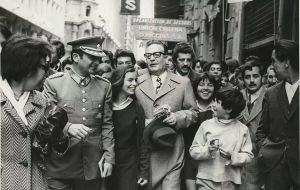MercoPress. South Atlantic News Agency
Piñera recalls that in September 1973 Chilean democracy was weakened and sick
 “My first reflection was that the coup d’état and the breakdown of democracy were going to be long and would generate more divisions, more hatred” said Piñera
“My first reflection was that the coup d’état and the breakdown of democracy were going to be long and would generate more divisions, more hatred” said Piñera  Salvador Allende became president in 1970 in a disputed election. He was also a controversial figure because of his surgeon graduation thesis in 1933
Salvador Allende became president in 1970 in a disputed election. He was also a controversial figure because of his surgeon graduation thesis in 1933 The president of Chile, Sebastián Piñera, has said that at the time of the overthrow of the Salvador Allende government in 1973, Chilean democracy was sick and that the crisis of the country was unsustainable.
“I want to make it very clear, without this meaning under any circumstance justify the abuses of human rights, which are never justified, at anytime, anywhere, in any context, but evidently that our democracy was deeply ill before the September 11, 1973, product of many factors,” Piñera told the newspaper La Tercera.
The Chilean president recalled that the day of the coup he was in the United States, and that same day he began his classes at the Department of Economics of Harvard University, to obtain a doctorate. He saw on television the images of the bombing of the presidential palace of La Moneda and the arrest of President Allende’s collaborators.
“My first reflection was that the coup d’état and the breakdown of democracy were going to be long and would generate more divisions, more hatred, more confrontations among Chileans,” he said.
According to Piñera, Chilean democracy “was very ill; It was not a sudden death on September 11. The weakening of the foundations of our democracy began to take shape in the decade of the 60s and was accentuated in the 70s and, of course, deepened in the 80s “.
He pointed out that in those decades “what happened in Chile was that certain groups wanted to re-found our country from scratch, excluding all those who thought differently. It started with the revolution in freedom of President Frei (1964-1970), the agrarian reform, followed with the Marxist revolution of President Allende (1970-1973) and continued naturally with the military period (1973-1990).”
“We all have responsibilities in what happened. In the weakening of democracy, in the breakdown of democracy and in the abuses of human rights. Not of the same nature or of the same magnitude, but all. I am convinced that many civilians who had power and influence did not exercise it fully to have avoided the abuses of human rights, “said Piñera.
Salvador Allende and the catch-all left wing Popular Unity that supported him won the September 1970 election with 36.61% of the vote, followed closely by Conservative Jorge Alessandri with 35.27%, and a distant third Christian Democrat Rodomiro Tomic, 28.11%. Since no candidate obtained a clear 50% of the vote, the confirmation was to be done by the two chambers of congress, which tradition showed would support who obtained the highest number of votes.
Since the Popular Unity catch-all coalition included several Marxist parties and armed radical groups, the congressional confirmation process took longer than expected but finally kept to tradition with the previous signing by Allende of a “Statute of Constitutional Guarantees”.
Although nobody doubted Allende's personal democratic credentials and his adherence to republican institutions and the rule of law, this was not extensive to the whole of the coalition, with some groups heavily armed and well financed. Likewise Socialist Allende himself was a controversial figure, since his surgeon graduation thesis in 1933, “Mental Health and Criminality” would certainly not be “politically correct” in our days or aligned with a Socialism based on liberal ideas.
Anyhow young Allende in his thesis followed the prevailing ideas in medical science and criminal law at that difficult erratic time, when capitalism collapsed, and authoritarian and totalitarian regimes with their racism and dissidence annihilation policies stood out for several years.




Top Comments
Disclaimer & comment rulesCommenting for this story is now closed.
If you have a Facebook account, become a fan and comment on our Facebook Page!